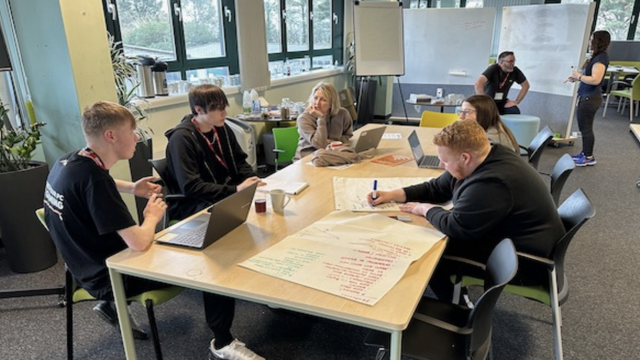I’m writing this blog post series because I want us as a digital industry to lessen our impact on the planet, and educating people by sharing the journey I’m on is an important way of doing that.
I introduce myself at meetings as a Service Design Lead and in-house annoying environmental person. I am also our Environment Strategist and a member of the BIMA Sustainability Council. I’m writing this blog post series because I want us as a digital industry to lessen our impact on the planet, and educating people by sharing the journey I’m on is an important way of doing that.
I am unashamedly passionate about helping to save the planet and everything that calls it home, but it is difficult to get the message across in a way that doesn’t make it seem like I’m vomiting information and statistics all over someone.
After listening to a talk by Lucy Stewart, one of the founders of #designandclimate, she told us about a debate they had; how do we talk about the climate and ecological emergency? The conventional wisdom has been to show people facts and figures about how bad it is, but this should be avoided, it’s about drawing on common values by asking people what they love about planet Earth.
Personally, for me, it’s wildflowers. The purple flower in the image at the top of this insight is a wild orchid that popped up in the wildflower meadow I am growing in my front garden (when I say growing I mean doing nothing).
The flowers and plants that coexist so tightly are beautiful and change constantly throughout the seasons, giving a welcome surprise whenever you look.
Meadows aid soil water retention, helping to prevent flooding, and support a huge number of insects (common ragwort, maligned for poisoning grazing stock, has 177 species of insects that use it as a source of pollen and nectar). This attracts birds, mammals and amphibians to feed on the insects. Working from home at the moment and listening to the birdsong (not the London traffic) has certainly improved my mental health too.
In the UK we’ve lost 97% of our wildflower meadows in this country since the second world war – another great example of why we need to check our hypocrisy and educate ourselves before forming our opinions about deforestation.
So please, when reading this blog series, think about your favourite natural thing on earth and do some research into our collective (not somebody else’s) affecting that thing.
Full disclosure. I estimate the impact of this blog post to be about 0.55g CO2e per page view. I have chosen to use a few images and videos in this blog series because I think they are important for illustrating the message I am trying to get across. We have used the WordPress plugin WebP Express to convert images to WebP format upon upload (which is the best format for image compression) to minimise their impact. This took some serious regression testing, but we’re pleased to say it’s now in place.
I am also analysing the impact of our TPXimpact website and will be recommending changes to help reduce its impact. Plus I’m writing the planet section of the annual report and will later this year start assessing our carbon conflicts and how to further lessen our impact on the planet.
The impact of Coronavirus
Finally, I can’t introduce a blog series in June 2020 without mentioning coronavirus. I attended an excellent Carbon Brief webinar a few weeks ago about the impact of pandemic lockdowns on the environment.
Despite the lockdowns, baseline carbon in the atmosphere will not reduce significantly (2.5ppm vs 2.48ppm) this year despite the pandemic. This is because El Nino will impact our natural carbon sinks (rainforests, marshlands, seas etc.) and restrict their ability to sink carbon. The analogy here is a bath full of water with the tap on full; all we’ve done during the pandemic is turn down the tap a bit.
The level of that tap reduction is predicted to be somewhere between a 2-10% reduction in global emissions. This figure has been revised multiple times as the virus has continued its spread but is the latest prediction.
To put that into context we need a 7-8% decrease in emissions every year for the next decade to meet the Paris agreement goal. Who fancies a lockdown every year for the next decade? Thought not! Therefore, we need to systematically change our economy, the way our public money is spent and our global emissions mix.
In terms of stimulating the economy, after the 2008 financial crisis, the economy was stimulated so much by public infrastructure, fossil fuel powered industry and a slow down of environmental regulations that, after the reduction in emissions caused by the financial crash, we (as a globe) actually went back above the trajectory we were on before the financial crisis.
If we stimulate the economy in that way again then jobs, economy and livelihood are all at risk because we will cause more extreme weather, more global pandemics, more food shortages, more migration and ultimately more conflict. We should stimulate the economy with green jobs:
- Building solar farms, wind farms, water power etc instead of infrastructure locking us into more fossil fuel use
- Subsidising solar panels, insulation, heat pumps etc for home owners
- Funding the rewilding of our land
- Funding research into carbon capture
Positive changes can be made
And to finish on a possible chink of light; China did not set an aggressive GDP target this year which will hopefully mean their infrastructure investment is reduced. If America elect a president who shows leadership on environmental and ecological issues and the UK and Brazil get a chance to do the same relatively soon, we might start the process of turning in the right direction.
EU countries are falling over themselves to make walking and cycling pledges with France’s rhetoric probably being the strongest. When they gave a bailout to Air France they stipulated a whole host of environmental related conditions. Those conditions appear to be trying to address the externalised costs that so many companies pass onto people, planet, communities and governments.
So with Covid covered, for now, let’s focus on the impact of the digital industry, and remember to reflect on that favourite natural thing on earth when reading on.
Latest stories
Transformation is for everyone. We love sharing our thoughts, approaches, learning and research all gained from the work we do.

An epic hackathon with students from City College Plymouth
Discover how we’re empowering students, fostering creativity and building digital skills for the future.
Read more
B-cause businesses can and should do better
Sharing how our commitment to serving all our stakeholders extends beyond B Corp certification
Read more
B Corp, B-cause change starts within
It’s B Corp Month, and we’re sharing a look at what we think it means to be a B Corp. This way forward!
Read more

